1 - 5 August 2000
6 August 2000
During this period, after the fairing encapsulation of the second Cluster pair, the Upper Composite was fully integrated with the Soyuz launcher and placed on the transfer train in preparation of the roll out to the launch pad.3, 4 and 5 August
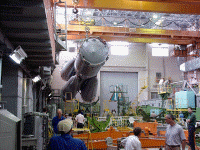 |
|
Hoisting of first stage on the launcher transport train (3 August) |
Early Thursday morning a special train took the composite to building MIK40. Over the next 3 days, the assembly of the launcher took place as follows:
- Connection to air conditioning system
- Removal of the rear cover of Fregat
- Mating of composite to Soyuz third stage and associated electrical verification
- In parallel, mating of the first and second stage
- Hoisting of the upper composite and the third stage on the transfer train
- Final integration of the complete launcher.
- Spacecraft final arming through the small fairing hatches, disconnection of air conditioning system and transfer to pad on 6 August.
As for all Soyuz launchers since the beginning of the Soviet space era, our launcher has been baptised by an orthodox priest.
Mating of composite to third stage (3 August)
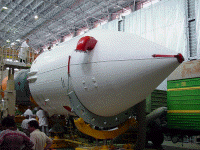 |
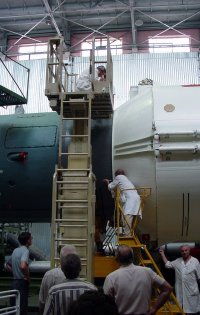 |
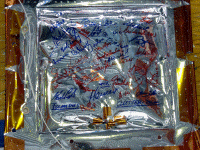 | |
|
The signatures of the whole launch team were collected on a Kapton foil and placed inside the thermal blanket covering the arming plugs. | |
Meanwhile, since 4 August activities have restarted intensively on the launch pad: the bunker and the catacomb of the launch pad have been reactivated after a 2-week hibernation period. The COTE and OCOE systems have been switched on and their link to the mast validated with the S/C simulator. Also, the links to ESOC via the NDIU have been re-established and revalidated.
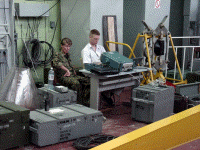 |
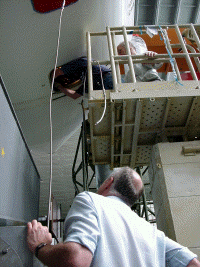 |
|
Above: Launcher electrical verification (4 August) Right: Arming of the spacecraft through fairing hatches under close PA supervision (5 August) (Colin Parkinson, ESA) |
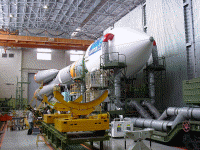 |
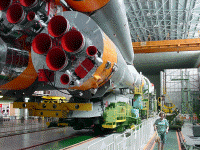 |
|
Launcher completely assembled on the transport train with the air conditioning (5 August) | |
2 August
The Fregat, Cluster pair and fairing assembly have been transferred from the Energia building to the MIK40 building close to the launch pad. The transfer took place overnight as the outside temperature is currently 40 °C despite the presence of an air conditioning system. The final assembly of the launcher, including its payload, will take place in this building.
1 August
Today was the last day to see the Cluster pair before they were encapsulated under the fairing. This operation was very impressive but rather fast, taking less than 2 hours! First, the Fregat on its support with the Cluster stack was tilted from vertical to horizontal position in half an hour. Then, the last red tag items, including the hoisting device on top of the Cluster stack, were removed, leaving just the arming plugs in place.
Tilting of the Cluster stack from vertical to horizontal
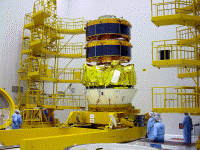 |
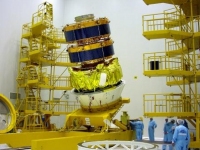 |
Next, the fairing on its support was carefully aligned with the Fregat assembly. Once the alignment was satisfactory, the fairing on its support was moved horizontally towards the Fregat assembly until the Cluster spacecraft started to enter inside the fairing.
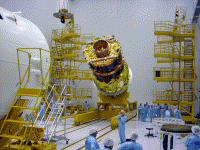 |
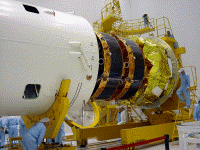 |
After checking correct clearance, under close supervision of the technicians (installed on a special portique), the fairing was again carefully moved horizontally until the Fregat and the fairing mechanical interfaces were in contact. After last positioning with centring pins, the Fregat assembly and the fairing weighting were bolted together.
Encapsulation of the Cluster stack
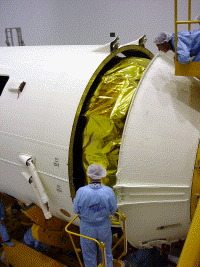 |
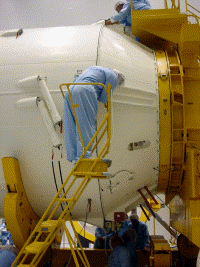 |
The next operation was to connect and check all electrical lines (umbilical and pyro).
Finally the fairing was sealed with a cover on its rear side (under Fregat) in preparation for transport tomorrow.

